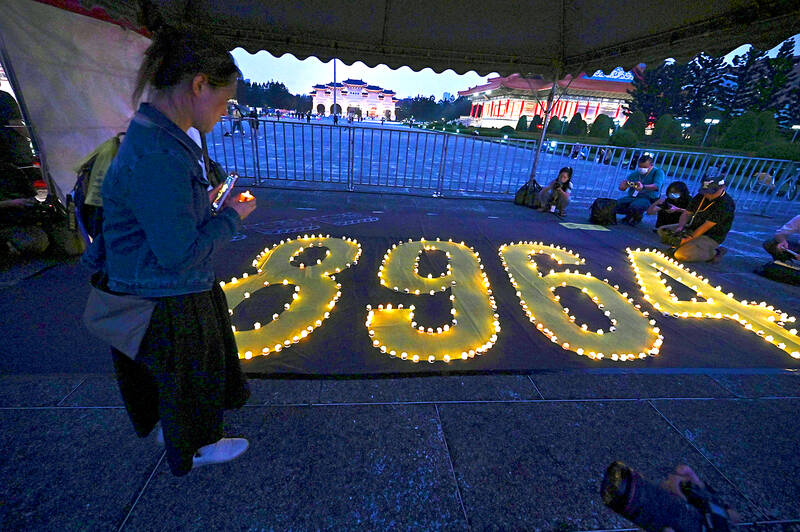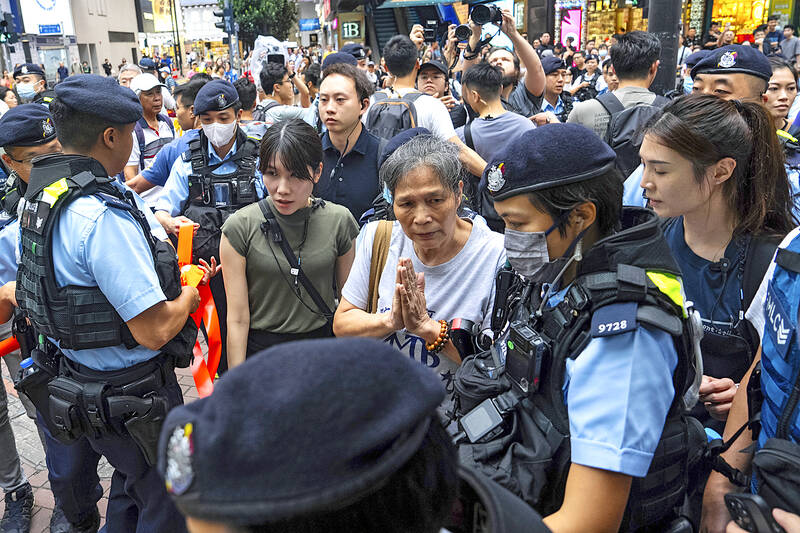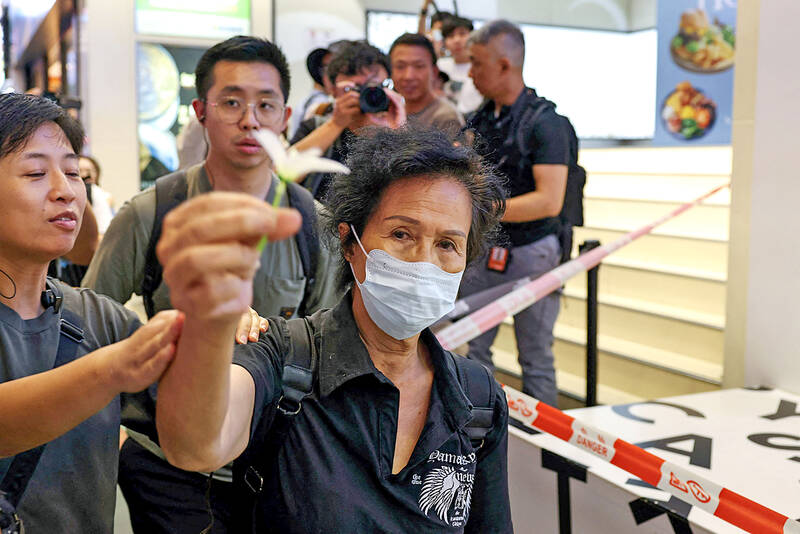President William Lai (賴清德) yesterday commemorated the 36th anniversary of the Tiananmen Square Massacre on social media, underscoring the importance of defending democracy and freedom.
Security was tight and activists faced pressure from police in Hong Kong on the anniversary of China’s bloody crackdown on democracy demonstrators in Tiananmen Square on June 4, 1989, an event Lai and US Secretary of State Marco Rubio said the world must not forget.
Public commemorations take place annually in more than 30 overseas cities including Taipei, where senior government leaders often use the anniversary to criticize China and urge it to face up to what it did.

Photo: Tu Chien-jung, Taipei Times
“Every year on June 4, Taiwanese society lights candles of remembrance grounded in the universal values” shared among democracies, Lai wrote on Facebook.
The commemoration “is not only to mourn history, but also to perpetuate this memory,” he said.
Authoritarian regimes erase history, “while democratic societies choose to preserve the truth and refuse to forget those who gave their lives — and their dreams — to the idea of human rights,” he added.

Photo: AP
The threat of authoritarianism by military intimidation, “gray zone” coercion, surveillance and extraterritorial repression remain a global challenge to democratic societies, Lai said, without naming China.
Taiwan stands on the front lines of defending democratic values worldwide and would continue working with like-minded partners to “safeguard the status quo,” and protect democracy and freedom, he said.
Taiwan endured decades of authoritarian rule before transitioning to democracy, through the sacrifices and efforts of countless democracy activists, Lai said.

Photo: Reuters
“We deeply understand the value of freedom and must not ignore the threats posed by authoritarian expansion to global democracy and the rule of law,” he said.
Rubio on Tuesday praised the courage of Chinese who were killed in the bloody crackdown.
“Today we commemorate the bravery of the Chinese people who were killed as they tried to exercise their fundamental freedoms, as well as those who continue to suffer persecution as they seek accountability and justice for the events of June 4, 1989,” Rubio said in a statement.
“The CCP [Chinese Communist Party] actively tries to censor the facts, but the world will never forget,” he said.
Premier Cho Jung-tai (卓榮泰) wrote on Facebook that “June 4, 1989, has become a taboo topic in China, while Taiwan has taken the opposite path by cultivating the soil of democracy and sowing the seeds of freedom.”
Since 1996, Taiwan has held eight direct presidential elections with three peaceful transitions of power between the two major parties, demonstrating to the world the nation’s pursuit of freedom and willingness to protect democracy, he said.
Taiwanese freely exercise the rights guaranteed to them in the Constitution, with the ability to criticize the government without fear of oppression, a right Chinese have not had for 36 years, he said.
Meanwhile, the Democratic Progressive Party paid tribute to those who have fought for democracy.
“Standing in a free land, June 4 reminds Taiwanese society that totalitarianism is not far away,” the party said.
“We will continue to strengthen national defense and economic resiliency, and cooperate with friendly international partners, working together, and safeguarding peace and democracy in Taiwan,” it said.
The Chinese Nationalist Party (KMT) said June 4 is a day to remember the difficulties of fighting for freedom and democracy.
“People must stand up in the face of dictatorship,” the KMT wrote on Facebook.
“The pursuit of freedom has never been eliminated in the hearts of Chinese people around the world. The KMT will never forget this history and will continue to fight for their democracy and freedom,” it said.
In Hong Kong, where tens of thousands used to gather to mark the anniversary before China’s imposition of Hong Kong’s National Security Law in 2020, hundreds of police officers stood guard around Victoria Park, the site of previous mass candlelight vigils, searching passers-by and taking away at least one activist.

MAKING WAVES: China’s maritime militia could become a nontraditional threat in war, clogging up shipping lanes to prevent US or Japanese intervention, a report said About 1,900 Chinese ships flying flags of convenience and fishing vessels that participated in China’s military exercises around Taiwan last month and in January have been listed for monitoring, Coast Guard Administration (CGA) Deputy Director-General Hsieh Ching-chin (謝慶欽) said yesterday. Following amendments to the Commercial Port Act (商港法) and the Law of Ships (船舶法) last month, the CGA can designate possible berthing areas or deny ports of call for vessels suspected of loitering around areas where undersea cables can be accessed, Oceans Affairs Council Minister Kuan Bi-ling (管碧玲) said. The list of suspected ships, originally 300, had risen to about 1,900 as

Japan’s strategic alliance with the US would collapse if Tokyo were to turn away from a conflict in Taiwan, Japanese Prime Minister Sanae Takaichi said yesterday, but distanced herself from previous comments that suggested a possible military response in such an event. Takaichi expressed her latest views on a nationally broadcast TV program late on Monday, where an opposition party leader criticized her for igniting tensions with China with the earlier remarks. Ties between Japan and China have sunk to the worst level in years after Takaichi said in November that a hypothetical Chinese attack on Taiwan could bring about a Japanese

The WHO ignored early COVID-19 warnings from Taiwan, US Deputy Secretary of Health and Human Services Jim O’Neill said on Friday, as part of justification for Washington withdrawing from the global health body. US Secretary of State Marco Rubio on Thursday said that the US was pulling out of the UN agency, as it failed to fulfill its responsibilities during the COVID-19 pandemic. The WHO “ignored early COVID warnings from Taiwan in 2019 by pretending Taiwan did not exist, O’Neill wrote on X on Friday, Taiwan time. “It ignored rigorous science and promoted lockdowns.” The US will “continue international coordination on infectious

DEEP-STRIKE CAPABILITY: The scenario simulated a PLA drill that turned into an assault on Taiwan’s critical infrastructure, with the launchers providing fire support Taiwan yesterday conducted this year’s first military exercises at Longsiang Base in Taichung, demonstrating the newly acquired High Mobility Artillery Rocket System’s (HIMARS) ability to provide fire support and deep-strike capabilities. The scenario simulated an attack on Penghu County, with HIMARS trucks immediately rolling into designated launch areas and firing barrages at the Wangan (望安) and Cimei (七美) islands, simulating the provision of fire support against invading forces. The HIMARS are supposed to “fire and leave,” which would significantly increase personnel and equipment survivability, a military official said. The drill simulated an exercise launched by the Chinese People’s Liberation Army (PLA) Eastern